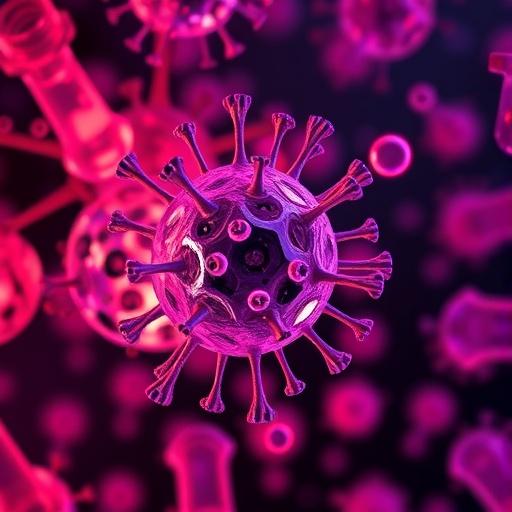In a groundbreaking study, a team of researchers has turned its attention to the intricate world of Natural Killer (NK) cells, a vital component of the immune system that plays a significant role in the body’s response to tumors and viral infections. The researchers, led by experts in cellular immunology, have published their findings in the journal J Transl Med, providing fresh insights into how these immune cells can be harnessed for innovative therapies aimed at acute leukemia. This development comes at a time when the medical community is actively seeking adaptive and effective strategies to treat this aggressive cancer.
NK cells are known for their ability to track down and eliminate cells that are infected or malignant. Unlike T cells, which require prior sensitization to antigens presented by infected cells, NK cells can respond more rapidly and indiscriminately, making them a crucial first line of defense in the immune response. However, their heterogeneity—meaning the diverse nature within their populations—adds a layer of complexity that can both hinder and enhance therapeutic approaches. The study emphasizes that this diversity is not merely a variable to be measured but a powerful tool that can be utilized to tailor immunotherapies for individual patients.
The researchers have observed that different subsets of NK cells exhibit unique features and functionalities, suggesting that a one-size-fits-all approach to immunotherapy may not be effective. By dissecting the characteristics of these various subsets, the team aims to identify which populations are most effective against acute leukemia. Such tailored strategies could revolutionize treatment paradigms by leveraging specific NK cell properties that increase the likelihood of successful patient outcomes. This personalized medicine approach is seen as a promising frontier in oncology.
In their investigations, the researchers conducted an exhaustive analysis of the NK cell repertoire among patients diagnosed with acute leukemia. Through advanced techniques such as single-cell RNA sequencing and mass cytometry, they mapped out the different NK cell populations, noting their activity levels, surface markers, and cytokine production capabilities. These advanced methodologies allowed them to paint a detailed picture of the cellular landscape, revealing that certain NK cell subsets are primed to respond more robustly in the context of leukemia.
Crucially, the findings indicate that the functional status of NK cells can vary significantly between individuals and even within different phases of the same patient’s disease. This variability underscores the importance of continuous monitoring and assessment in the treatment process. The ability to dynamically adjust therapeutic strategies based on the patient’s immune profile may enhance the effectiveness of the intervention, potentially leading to higher remission rates and improved long-term survival.
Furthermore, the researchers have pinpointed specific NK cell markers that correlate with effective anti-leukemic activity. By identifying these molecular signatures, it becomes possible to develop targeted therapies that not only enhance NK cell function but also mitigate the potential side effects often associated with more conventional cancer treatments. Such advances could significantly change the current treatment landscape, offering hope to patients who previously had limited options.
The implications of this research extend beyond acute leukemia alone. The principles derived from optimizing NK cell-based therapies could apply to a broad range of cancers, as well as infectious diseases where similar immune evasion tactics are employed by pathogens. The adaptability of NK cells, alongside their ability to evolve in response to environmental cues, positions them as a vital component in the ongoing quest for more effective immunotherapeutic strategies.
As the researchers continue their work, they are hopeful that forthcoming clinical trials will validate their findings, allowing them to transition their laboratory discoveries into tangible therapies. They stress that collaborative efforts among immunologists, oncologists, and data scientists will be crucial in pushing these advances from bench to bedside. Achieving success in developing NK cell-targeted therapies could not only alter the course of treatment for acute leukemia but also set the stage for a new wave of immune-based interventions across various fields of medicine.
With this new understanding of NK cell heterogeneity, the researchers have laid the groundwork for future studies that will further elucidate the pathways and mechanisms that govern NK cell responses. This could lead to innovative solutions that optimize patient outcomes, making immunotherapy a feasible option for a greater number of individuals diagnosed with acute leukemia and other malignancies.
Looking ahead, ethical considerations regarding the use of advanced cellular therapies remain paramount. The research team is committed to addressing potential challenges, such as equitable access to personalized therapies and the long-term effects of modifying the immune response. These conversations are essential not just for effective patient care but also for ensuring that scientific advancements translate into real-world benefits for diverse populations.
At the heart of this endeavor lies a collective vision: to create a future where acute leukemia is no longer a formidable adversary, but a treatable illness that is managed through cutting-edge immunotherapy rooted in a deep understanding of the body’s immune system. The lessons learned from the heterogeneity of NK cells will undoubtedly inform a new era in cancer treatment—one that acknowledges the complexity of human biology and embraces it to create targeted, effective, and compassionate care.
In conclusion, this promising research illustrates that the intricacies of NK cells harbor untold potential in the fight against acute leukemia. With ongoing investigations and clinical trials on the horizon, the hope is that these insights will catalyze a revolution in personalized immunotherapies that ultimately transform the landscape of cancer treatment for future generations.
Subject of Research: The heterogeneity of the NK cell repertoire for immunotherapies for acute leukemia.
Article Title: Leveraging the heterogeneity of the NK cell repertoire for the development of immunotherapies for acute leukemia.
Article References:
Ferron, E., Jullien, M., Gagne, K. et al. Leveraging the heterogeneity of the NK cell repertoire for the development of immunotherapies for acute leukemia. J Transl Med 23, 1218 (2025). https://doi.org/10.1186/s12967-025-07093-y
Image Credits: AI Generated
DOI: https://doi.org/10.1186/s12967-025-07093-y
Keywords: Natural Killer cells, acute leukemia, immunotherapy, cellular heterogeneity, personalized medicine.




